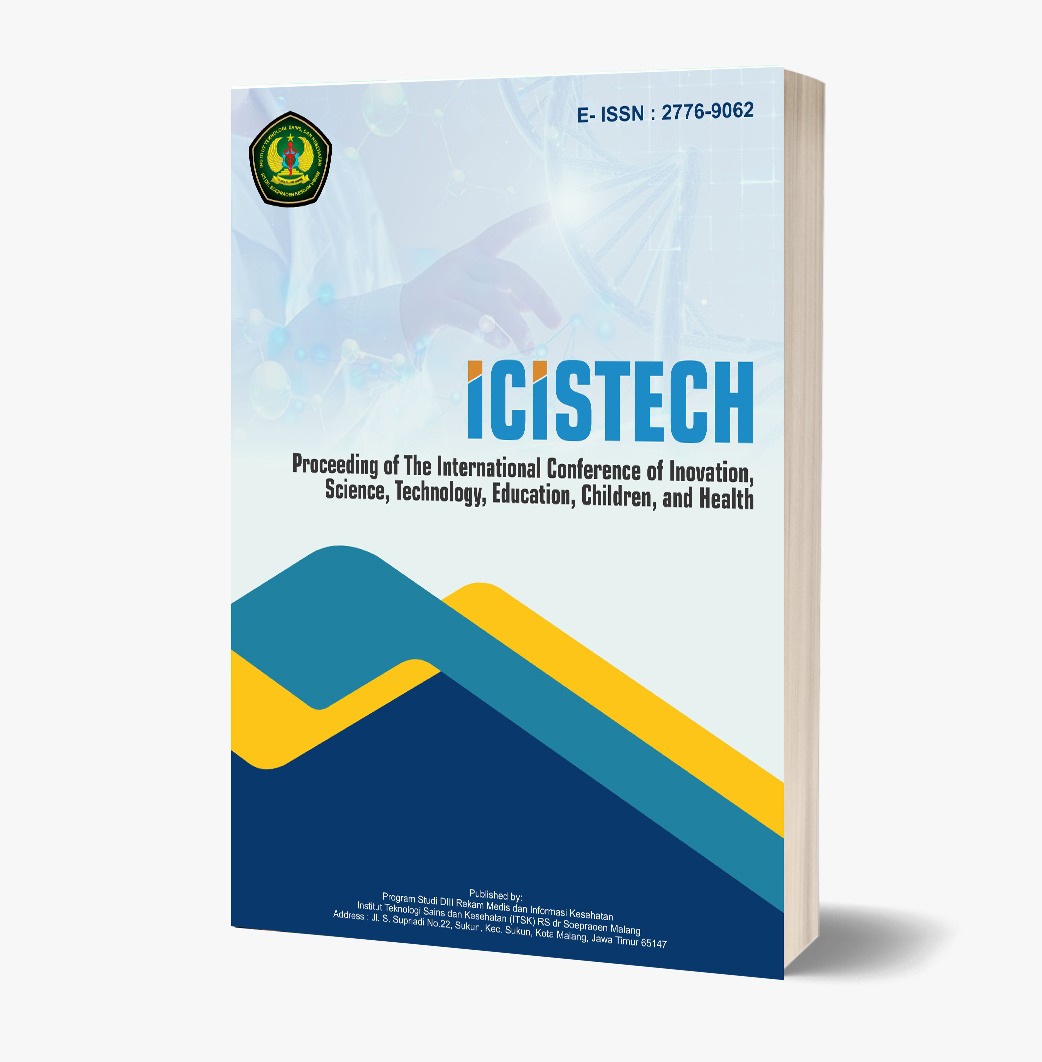The Influence of Husband's Support on Mother's Readiness for the Labor Process at TPMB Ny. Afita Delianah, Turen, Malang
DOI:
https://doi.org/10.62951/icistech.v5i1.263Keywords:
Labor Process, Husband's Support, Maternal ReadinessAbstract
Every pregnant woman requires proper care throughout her pregnancy, as it is a critical time for both the mother and the developing fetus. However, many husbands tend to leave their wives to cope on their own, especially after childbirth, not fully realizing the emotional and psychological challenges their wives face. Pregnancy often brings anxiety and fear, and during this time, a pregnant woman greatly needs support from her husband, family, and others around her. The husband’s reactions and behaviors, along with his attitude towards the pregnancy and childbirth, can significantly influence the mother’s emotional and psychological readiness for labor. A supportive husband can help reduce anxiety and increase the mother’s confidence and preparedness for the labor process. This study aims to examine the relationship between husband’s support and the mother’s readiness in facing the labor process. The research design used for this study is correlational, which aims to identify the relationship between variables. The sample for this study consisted of pregnant women attending TPMB Ny. Afita Delianah in Turen Subdistrict, Malang Regency. Data was collected through a structured questionnaire, and statistical analysis was performed using the Chi-Square test. The results of the study indicated a significant relationship between husband’s support and the mother’s readiness for labor, with a p-value of 0.001 (p < 0.05). This finding underscores the importance of involving husbands in the pregnancy and labor process, as their emotional and practical support can have a profound impact on the mother’s mental and emotional state. It is essential that healthcare professionals and family members encourage and provide opportunities for husbands to actively support their wives during this critical time, as it can positively affect the overall childbirth experience
References
Arikunto, S. (2010). Metode penelitian. Rineka Cipta.
Bobak, I. M., Lowdermilk, D. L., & Jensen, M. D. (2008). Maternity nursing (6th ed.). St. Louis: Departemen Pendidikan Nasional.
Departemen Pendidikan Nasional. (2011). Kamus besar bahasa Indonesia (Edisi ke-4). Jakarta: Gramedia Pustaka Utama.
Elizabeth, S. W., & Purwoastuti, T. E. (2016). Asuhan kebidanan persalinan & bayi baru lahir. Yogyakarta: Pustaka Baru Press.
Indiarti, M. T. (2014). The ultimate book of pregnancy. Yogyakarta: [Publisher not specified].
Kolase, T., Hofoss, D., et al. (2003). Indications for caesarean deliveries in Norway. American Journal of Obstetrics and Gynecology, 188, 864-870. https://doi.org/10.1067/mob.2003.217
Manuaba, I. B. G. (2012). Obstetrics, gynecology, and family planning for midwifery education. Jakarta: EGC.
Maulana, M. (2016). A complete guide to pregnancy: Understanding reproductive health, how to deal with pregnancy, and tips for parenting. Yogyakarta: Katahati.
Mukhadiono, D., et al. (2015). The relationship between husband's support and anxiety levels in third-trimester primigravida mothers facing labor. Jurnal Kesehatan Masyarakat, 19(2), 110-115.
Novi. (2012). Peran suami sebagai pendamping dalam proses persalinan normal. Jakarta: EGC.
Nurhidayati, N., & Siti, S. (2023). The relationship of family support, maternal readiness, and anxiety level of pregnant women before giving birth. Jurnal Eduhealt, 14(3), 1305-1310. https://doi.org/10.38037/jsm.v13i2.106
Rahmi, R. (2022). Husband support for readiness to face childbirth in third-trimester pregnant women. Jurnal Ilmiah Aisyiyah, 6(1), 1-6. https://doi.org/10.36782/jika.v6i1.2398
Sari, K., & Sartika, R. A. D. (2021). The effect of the physical factors of parents and children on stunting at birth among newborns in Indonesia. Journal of Preventive Medicine and Public Health, 54(5), 309-316. https://doi.org/10.3961/jpmph.21.120
Sufian, S., & Hassen, M. (2022). Husbands' plan to participate in birth preparedness and complication readiness in Haramaya Health and Demographic Surveillance System site, Eastern Ethiopia. Frontiers in Public Health, 10, 856809. https://doi.org/10.3389/fpubh.2022.856809
Wulandari, R., & Rimbawati, Y. (2021). Provision of complementary food with nutritional status of infants aged 7-12 months. Journal of Maternal and Child Health, 7(3), 215-223. https://doi.org/10.55045/jmch.v7i3.155
Downloads
Published
How to Cite
Issue
Section
License
Copyright (c) 2025 Proceeding of The International Conference of Inovation, Science, Technology, Education, Children, and Health

This work is licensed under a Creative Commons Attribution-ShareAlike 4.0 International License.













